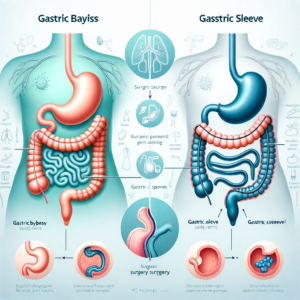
You can contact us immediately via WhatsApp for our Health Experts to make a free analysis for you!
Evaluating surgical weight loss methods can be challenging for patients considering weight loss surgery, given the wide variety available today. Letsmedi’s Healthcare specialists will guide you in determining the best option for your particular situation.
Gastric Bypass vs. Gastric Sleeve
In this section we will examine two common bariatric surgeries: Gastric Sleeve and Gastric Bypass. During the Gastric Sleeve procedure, also known as a Vertical Sleeve, the surgeon removes part of the stomach to create a cylindrical “sleeve” shape. In the case of Gastric Bypass, a small pouch is created by the surgeon effectively bypassing the larger portion of the stomach.
Gastric Bypass vs. Gastric Sleeve: Similarities
When exploring weight loss surgery options, Gastric Bypass and Gastric Sleeve are two prominent procedures that share several similarities. Both these bariatric surgeries typically require a hospital stay of 2-3 days and are characterized by their irreversible nature. The primary goal of both surgeries is to reduce the stomach’s capacity, thereby limiting the amount of food intake and promoting a feeling of fullness sooner.
Gastric Bypass involves creating a small stomach pouch and rerouting the small intestine, while Gastric Sleeve involves removing a portion of the stomach, resulting in a sleeve-like structure. Despite these differences in approach, both procedures effectively decrease the total volume of the stomach. This similarity extends to the post-operative recovery and lifestyle changes that are essential for successful outcomes.
Patients undergoing either surgery are advised to adhere to a strict diet, typically involving smaller, more frequent meals that do not exceed 800 calories per day. This dietary change is crucial for achieving significant weight loss, ranging from 60-80% of excess weight within the first 12 to 18 months following the surgery.
Gastric Bypass vs. Gastric Sleeve Differences
As a medical team specializing in bariatric surgery, we often guide patients through the process of deciding between Gastric Sleeve Gastrectomy and Gastric Bypass surgery. Each procedure has its own unique qualities and outcomes, and understanding them is crucial to making an informed choice.
Considered to be less invasive, Sleeve Gastrectomy surgery typically offers a slightly faster recovery period. In this procedure, part of the stomach is removed to create a tube or ‘sleeve’ shaped stomach. This reduction in stomach size reduces food intake, allowing patients to feel full more quickly. Patients can expect a steady weight loss, usually losing around 60-70% of their excess weight in the first 12 to 18 months after surgery. It is important to note that gastric sleeve surgery is irreversible, a critical factor to consider when choosing this option.
On the other hand, Gastric Bypass, a procedure with a rich history of delivering consistent results for decades, involves creating a small pouch in the stomach and connecting it directly to the small intestine. This bypasses a significant portion of the stomach and intestine, resulting in significant weight loss. Patients who undergo Gastric Bypass usually experience rapid weight loss in the first six months and ultimately lose about 60-80% of their excess weight within the first one to one and a half years. Although Gastric Bypass can be reversed, such reversals are rare.
Which Surgery Is Better?
In this context, it is very important to collaborate with your healthcare provider to determine the most appropriate weight loss surgery for your needs.
If you need support in this regard, you can get Free Support on WhatsApp!
Typically, individuals who undergo Gastric Bypass experience a 50 to 80 percent reduction in excess body weight within the first 12 to 18 months. In contrast, gastric sleeve patients usually see a 60 to 70 percent reduction in excess body weight in the same time frame. Gastric Bypass surgery is often recommended for patients with a Body Mass Index (BMI) over 45, especially those who are extremely obese.
For an in-depth understanding and comprehensive comparison of the various bariatric surgery options available at UPMC Bariatric Services, we encourage you to learn more about our surgical procedures.













